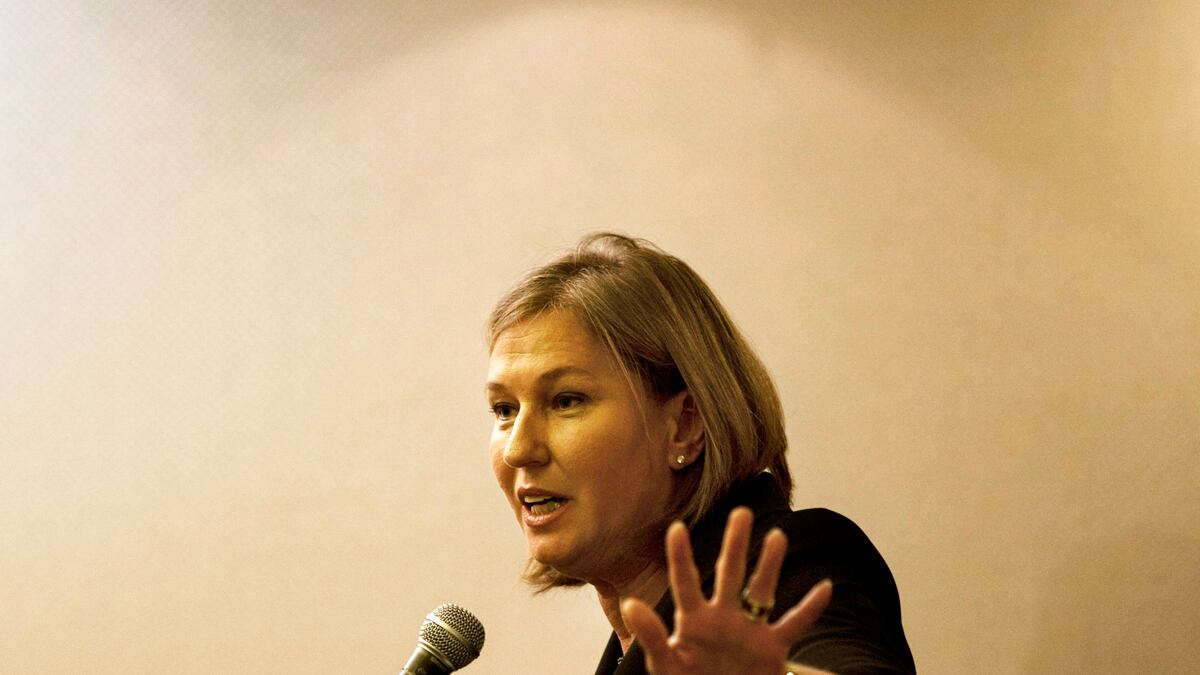The lighting set-up at one of the two main stages at Israel’s Herzliya security conference, in a large, dark and air-conditioned tent next to the hotel, went up and down and even changed color. Activities on stage got projected on giant screens flanking the dais, or on the jumbotron-like rig overhead. The tent's digital glow and fluctuating lighting evoked a very, very fancy wedding. But last night at the conference, Israeli Justice Minister-designate Tzipi Livni was in no mood for nuptials: “I don’t want to just get married,” she said of a potential deal with the Palestinians to finally establish a two-state solution. “I want to divorce ourselves.”
It’s an old peace process cliché, and Livni’s just the latest to deliver it. But the image of her on stage—four images actually, including the screens—waving her arms and delivering her rapid-fire speech in favor of a deal revealed an urgency one might not expect from a confab known for its right-wing bent. She dismissed Israelis who support “Greater Israel,” and those who want to “go back to Biblical times”--both references to those interested in permanently keeping the West Bank in Israeli hands. A two-state deal was "the most important interest of of our nation," she said. “That is the only way we will have the existence of a Jewish democracy.”

Livni’s views lined up with the alarming moralistic positions of leftists on the panel that followed her talk. “As you can see, they brought me, the guy from Haaretz”—a liberal Israeli daily—“to moderate the panel on the two state solution,” quipped journalist Barak Ravid. He opened his talk by citing a Haaretz colleague’s article on the treatment of a Palestinian worker on an Israeli settlement, a piece that “gives a glimpse into what I call the de facto apartheid reality in the West Bank. It's neither Jewish nor democratic.” Livni’s recognition of Palestinian narratives was a bit less sensitive to their conditions: “Since Palestinians should understand that between the Sea and the Jordan, Jews will continue living there. So too must we realize that they aren't going anywhere.”
Nonetheless, Livni’s impassioned but sometimes rambling address gave the tired cliches a new energy: she wants a deal and she wants it now. That’s why she decided to cut a deal and join Benjamin Netanyahu’s upcoming government—after returning to electoral politics with a new party and six members of the Knesset—as the minister with control over talking to the Palestinians. And she’s bringing urgency: “Yes, we live in a tough region,” she said, but pointing out that unstable Egypt had upheld its 1979 peace treaty. “It’s much better, much easier to preserve something that’s already been signed. Most Israelis I know would embrace things that are no longer on the table.”
Not everyone was sold, most notably the aged Israeli political scientist Shlomo Avineri, who spoke on the panel. “Let me apologize for Tzipi Livni,” he said, referencing her quick dash from the wedding tent after her talk. “This is the style of Israeli politicians and it’s why they are sometimes a little out of touch with reality.” He noted that Livni would serve in “most right-wing nationalist government ever,” a coalition led by a pro-annexation Likud that includes the like-minded Jewish Home. “But good luck to her.” Indeed, the deal-making here isn't about security—“Any border Israel picks will be defendable,” said the retired Israeli Major General Nati Sharoni on the dais—but about political will, something both Netanyahu and Palestinian Authority President Mahmoud Abbas could well lack.
But Livni thought even interim steps or a postponed agreement could be enough, for now. “I don’t think it’s an option to give up,” she said, adding that she hopes to bring some progress back to Herzliya as soon as next year. “That’s why I joined this government. I believe that we must try despite all the risks.” We'll soon see if the government she joined will give her a long enough leash to do so.






